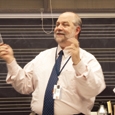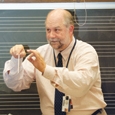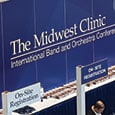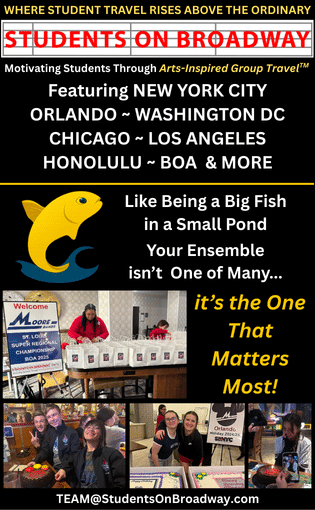David Fodor has taught in Illinois schools for 36 years, including the last 21 at Evanston (Illinois) Township High School. Prior to that he was director of bands at Western Illinois University. He is a percussionist and jazz musician. Fodor will retire at the end of this school year, and as he looks back at an outstanding career, he shared some of the lessons he learned and reflected on what he wished he had known as a new teacher. “In a 36-year career, I am proud of the thousands of students I have taught, but it is frustrating to think of the tens of thousands who never enrolled in a music class. Music students are about 10-15% of the student population, but there is another 85-90% out there who do not get the benefit of music education. Music is pervasive in students’ lives. As they walk between classes, most wear headphones and listen to music, but few ever do more than just listen. Find ways to get them involved. Younger teachers should not be so focused on the performance students that they forget there is a whole school to teach.
“Music education has become mostly based on performance groups, but one of the I have enjoyed is teaching non-performance music classes. Even though I could not reach the whole school, we did pull in students we otherwise would have missed because they did not sing or play an instrument. I encourage new teachers to consider what they can teach besides performance. Most schools have a technology lab, so music technology is a good option that also allows you to teach music composition. Other classes might include improvisation with guitar or piano, theory, and survey classes. I teach a class called Seminar in American Music, that combines historical study, listening exercises, and a performance component in which students learn enough piano, guitar, bass, and drums to be able to get through the F blues. These are all ways to draw in students you might not otherwise teach.”
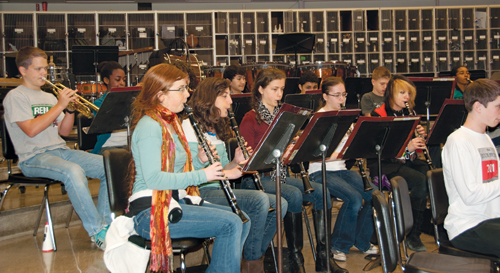
Find Your Teaching Style
A philosophy of music is the sum of your experience plus what you want to add to it and change. My first band director, Tom Goodwin, down in New Lenox, Illinois had a wry sense of humor that clicked well with junior high students. He was an excellent musician who loved what he was doing. Even back then his attitude inspired me, and as a teacher, I frequently considered how a sense of humor fits my teaching.
It is important to be yourself, however. Everyone has a sense of humor; the question is what kind and how to express it. Reflection will help you decide what to project as a teacher. I am passionate about the music we play. Over time, I realized that sometimes I come across as aggressive rather than passionate. That is where a sense of humor is helpful. Model your passion for the music so students feel the same way, but balance that with a sense of humor and understand yourself well enough to project what it is you really feel.
Be honest with students. If you do not know an answer, say so, and then go find out. It was difficult for me to admit I didn’t know something when I was starting out. You are trying to establish yourself as an expert but are only four or five years older than students. It is difficult to admit ignorance, but it is always the best approach.
Find Mentors
In my early years I had great mentors. In my first teaching job, I was very fortunate to have the opportunity to work with two other instrumental music teachers. I was a percussionist, another was a brass player, and the third was a woodwind player. We each led separate grade school programs but worked together at the high school and were able to help each other a great deal. When I was in college, I foolishly did not take the secondary methods courses seriously. I still remember walking into the bandroom before my first year as a teacher to discover four young children with trumpet cases in their hands asking if I was their new teacher. Seek out help to learn as many instruments as you can and make notebooks of information on the various instruments. Spend time learning instruments with someone who can really help you; it is worth every second. When I taught at Western Illinois University, many of my students ended up in positions where they were the only music teacher for miles around. They contacted each other and shared tips and ideas.
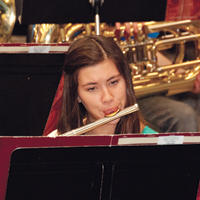 Student Mentors
Student Mentors
Students can be mentors too. In Evanston we developed a student mentorship program that runs during the middle two quarters of the school year. Older, more advanced students work with those who need help or lack the practice skills to improve. A peer teacher is more interesting to some students and certainly is more affordable. Everyone benefits. The weaker players get help and the stronger players learn from teaching.
We found the program worked best during the middle two quarters because in the fall everything is still being established, and marching band takes a great deal of time. Students also do not have a performance assessment until near the end of first quarter. The first official assessment is a good time to suggest areas of improvement and encourage students to seek help.
At the end of the third quarter, the mentors and students perform together at a solo and ensemble festival. The performance is a goal to work toward and a good way to end the program for the year.
Parents
New teachers often struggle to work with parents. I remember early in my career when I was not married yet, parents would sometimes become angry and say, “You don’t have children; you don’t understand.” This can be very frustrating.
Always take time before responding to parents comments. Be a good listener and allow the parents to speak. Depending on the parents and the level of anxiety or anger, they may talk for a long time. Sit there, listen, and take notes if necessary. Don’t interrupt them; just keep track of the points you want to address. After a while angry or upset parents will run out of steam. Often they are overreacting and need to get things off their chests. Then they calm down. That is when you can come back point by point. Respond to them, “Here is what I think I heard you say,” and spell it out so they know you heard them.
When a parent is angry about a child’s placement after auditions, I explain exactly how the audition process works. We build in safeguards for just this type of situation. For example, auditions are blind. They are recorded by proctors, and students are given numbers. The directors listen to recordings with no idea who is playing. Often a logical explanation is enough, as parents may not understand the process or the reasoning behind it. With this audition example, I have the tapes there at the meeting. I first play the best example I have of how a piece sounds and then play the student’s audition. While it is playing, I have the written assessment in front of the parents so they can see my thoughts as I point out aspects of the recording. In doing this you show your expertise and share information with the upset parents in a logical, calm manner. (I do this with students who feel an audition result is unfair as well.) I end the conversation with, “Rather than talking about who is sitting in which chair, let’s discuss what your child can do to become a better player.” This flips the meeting around to something positive and often gets parents on your side.
Quite often when parents are angry, they do what you should never do and start talking right away. It is similar to the rule about email: never send one while angry. As a young teacher, it is difficult to handle this sometimes. One solution is always go to the administrators first. Explain the situation, how you would like to handle it, and ask what the administrator thinks. Do not ask, “What should I do?” unless you are at an absolute loss. If you come to an administrator right away, he will usually help.
Avoiding Conflicts
Some advance planning can also avoid many problems. Parents often complain when music schedules interfere with other activities. We developed guidelines for conflicts between the schedules of different departments. It took six months of meetings, but the music department, athletic director, and person representing all the clubs came up with a policy. The policy prevents students from feeling caught in the middle of different teachers’ and coaches’ expectations but puts responsibility on them to handle the scheduling conflicts.
It starts with the premise that from time to time there will be conflicts, so there should be a predetermined process to go through. One of the first things we decided was what takes precedence. For example, a game or performance is always agreed to be a higher priority that a rehearsal or practice. Another consideration is that band is an academic subject, and a sport is an extracurricular activity. Curricular almost always supersedes extracurricular. This is basically common sense, but by having it in writing, everyone can agree. The most important component is that students do not get caught in the middle. If a student comes from a morning swim team practice to tell me that he cannot be at rehearsal after school the next day because the date of a meet has changed, then I do not penalize him for attending the meet.
The next part of this is that timing is everything, and we encourage students to take responsibility for their schedules. Unless there is an unexpected time change for an event, the onus is put on students to look at the calendar as far in advance as possible so when conflicts are found they can be dealt with right away. I have a couple students who are wind players in the Chicago Youth Symphony Orchestra. As soon as they won their auditions, I got emails from them about events scheduled months in advance. The policy helps students realize that they should manage their schedules, and that is a good teaching tool.
When a student finds a conflict, he is to notify the teachers and coaches on either side of the conflict. Then the adults communicate with each other and decide how important the conflicting events are. After we sort this out, we go back to the student with a suggestion of what we think should be done. Ultimately, the decision is left to the parents and student. If a student picks a regional game over a performance, I might disagree with the decision, but as long as they followed the process, I accept the choice. I have found, however, that the students and parents almost always make an appropriate decision.
Organization
I did not realize as a new teacher that 80% or more of my time would be spent on organization and communication and very little would be spent on music making. I did not realize I would have a music library to maintain, uniforms to care for, or an instrument inventory to manage. At bigger schools, this can mean hundreds of thousands of dollars worth of equipment. So don’t expect to spend the majority of your time making music. This means you have to be efficient in what you do.
Archive your work. When I was in high school I kept all my programs from concerts. It has served me surprisingly well over the years. In December we had a joint concert with the University of Illinois Wind Symphony, and one piece I was considering was American Salute. Oddly enough I was looking through these programs last month, and I found the first program from my first concert down there with Harry Begian. American Salute was on that concert. It was odd to realize that both my first and last concerts there would include this piece.
Saving concert programs helps me keep track of what I have played or heard other groups play. This may also help the person who follows you at a school. When you take a job at a new school, it can be difficult to get a sense of how the group sounded in the past and what repertoire they have played if they have not kept good records. This information can really go a long way in helping a teacher get off to a good start. Quite often there is no transition for new teachers.
Cleaning a back room ten years ago I found binders from the 1970s filled with all the concert programs and other interesting material from those years. It stopped around 1982. When I saw those, I started to do the same thing because I figured someone would want, at some point, to look back to see what we did.
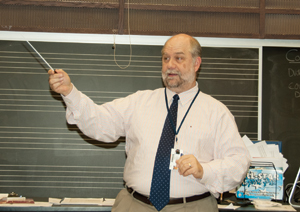 Expressive Playing
Expressive Playing
I frequently have to ask students to exaggerate, because if you say to crescendo more, they only give you a little bit although they might think it is a lot. Develop students’ confidence to the point where they give you a lot when you ask for more. I see this in both concert and jazz band. In jazz I frequently tell the bari sax and bass trombone players, “Play as loud as you can all of the time, and I’ll tell you when it’s too much.” The more expressively that students play, the more they will enjoy the music.
I once saw a great clinician get a junior high band to play a phrase more expressively. He asked one student to play the phrase with the instruction to interpret it any way he wanted. The student played a rather vanilla rendition, and the clinician urged him to be more expressive. After much encouragement the student played with some nice dynamic shaping. The clinician then told the whole band to play the phrase and said, “I want all of you, each in your own way, to do something like this, with similar intensity. Do anything.” About 80% of the students decided to copy the same dynamic shaping, which was what fit the music best anyway. After they heard the results, they realized how much better they sounded. If music is played expressively it is noticeably more beautiful.
Practice Habits
Tom Godwin, my grade school band director, always said, “If you can count it, you can play it.” I say that a lot. Students sometimes come into the program needing work on counting. At one rehearsal there was a 16-note passage that started in the clarinets on beat one that the flutes picked up on the and of two. The flutes were all over the place, so first we figured out how to count it. We counted it in tempo; we put it back in context with clarinets counting their part; we articulated the passage rather than slurring it; and then we played it. With that the younger students understood it.
I always try to teach practice habits from the podium, because rehearsal technique is not all that different from what you hope they do at home.
I teach students to take things slowly and accurately at first. I had an interesting conversation with Greg Bimm, the highly respected director of bands at Marian Catholic High School, whose father was a cornet player. He said that every night the two of them would sit and practice together. If he made a mistake, his father would make him play it ten times in a row correctly before they went on. Great musicians don’t practice until they get something right, they practice until they can’t play it wrong.
Students are so fragmented that it is easy for them to think, “I only have ten minutes, so it isn’t worth practicing,” but a little bit every day is better than trying to cram it at the last minute. I tell students that practice is just as important as their other homework.
* * *
Technology
I strongly recommend that new directors learn web design. In the days before the web, I taught a class called Multimedia Technology in the Arts that was all about taking sound, text, and pictures and putting them together using HyperCard. When the internet came along, I thought it would be a great way to share my students’ work. The school heard about this and wanted a website, so I was the school’s first webmaster. It grew so fast that within two or three years I had to choose between being a webmaster or a band director. The internet is a huge advantage for teachers. I rarely send paper home anymore. Email to parents is easier, quicker, and more reliable.
We have taken the band to Disney World every 4 years for the last 20 years. We always photocopied every park pass with the students’ names written on each one because invariably when you take 200 students, someone is going to lose their park pass. If you do not have a copy of the original, you have to pay for another one. This last trip we just told students to take a picture of the pass with their smartphones. If a pass was lost, the student could go to the front gate and show the picture. Find ways to use technology to make your job easier.
Other Ideas
• Know your students. I didn’t realize this right away, but you are likely to be the teacher who knows your students the best. You may be the only teacher they have all four years. Be prepared to teach adolescents to grow up and plan to write many letters of recommendation.
• Social Media. Never friend students on Facebook. I make alumni wait for one year before I add them.
• Preparation. Make sure that 80% of your time is spent preparing for rehearsals. As much as you might hate lesson plans, take the material you want to rehearse, divide up the available time, and decide how to accomplish your goals.
• Goals. Have a set of goals for each rehearsal. If it does not go well, be able to adjust the plan and move onto the next thing. Come back to the troublesome section later from a new direction.
• Repertoire List. If you haven’t started developing a repertoire list based on more than what you played in school, do so.
• Rehearse During Rehearsals. Don’t use lesson time to hand out music. If you want to listen to music, be strategic about it. Students can listen to music at home, but rehearsal time is the only opportunity for them to work with you. Post announcements on a chalkboard or PowerPoint. Identify distractions and figure out how to make them go away. If you show that you value rehearsal time, students will too.
• Be Involved. Join organizations and give back to your profession. They always need volunteers and it is a great opportunity for you to meet people and learn from them. Keep playing. Don’t give up being a musician yourself.
• Listening. I always tell students that you are what you listen to and try to expand their listening habits. At the same time, don’t be afraid to learn from students. They listen to interesting stuff.
• Jazz. If you play an instrument not usually found in a jazz band, find a way to get some jazz experience anyway.
